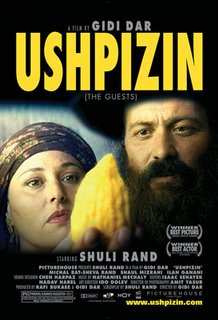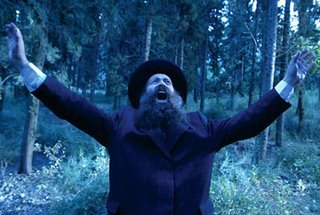Ushpizin

I watched a marvelous movie this week called Ushpizin. This about an
orthodox, though at times unorthodox, Jewish Rabbi named Moshe Belanga who smokes, regularly misses synagogue, and is married to a woman who has been unable to provide him with children. It takes place during the time of the Sukkot festival in which the Jews would build a temporary dwelling place and live there for a matter of days in memory of their former way of life after the Exodus when they were a nomadic people who had not yet inherited the promised land. They would also entertain guests during this time as well, which is what the word "ushpizin" means in Aramaic.
It's just prior to the Sukkot holiday and Moshe Belanga has no money to buy the things necessary to celebrate the holiday including a succah (the temporary building.) When we first see Moshe, he enters a shop to look for some lemons that are used in the festival. He has his eyes set on what the dealers call "the diamond" since it is the most beautiful lemon in all of Jerusalem. But their asking price is ridiculous, a thousand shekels. Moshe, after examining the lemon gives it back to which the dealers ask, "Are you not buying?" Moshe just shrugs his shoulders and replies, "With God's help," and leaves. The next scene, Moshe is in the Yeshiva hoping to receive enough funds from the Rabbis so that he and his wife may celebrate the festival. However, they give him nothing. He goes home rejected and informs Mali, his wife, of the bad news. They get into a bit of an argument and Moshe stresses that God will provide for them.
He proceeds to quote to her a saying he heard from one of the Rabbis, "where something is lacking I know that either it was not prayed for or it wasn't prayed for enough." Mali's response is great: "so then go pray." To which Moshe replies that he's tired and doesn't feel like praying. Mali chides him for quoting such things to her if he has not intention to take the words and put them into practice. I loved this scene because this is the way a lot of us are, including myself from time to time. We spout out great words of wisdom and insight, but then when it comes time to apply such things, we recede back into our comfort zone.
At any rate, Moshe does go and pray and it is a beautiful scene. Moshe is honest with his Lord, informing him that he is "a lump of saddness" because he can't provide for his wife during the holiday. He proceeds to pray fervently for a miracle. The beauty of this scene is that it is cut with two different scenes. One in which Mali herself is praying from the Psalms, and one in which Moshe's miracle is underway with a certain man who has a thousand dollars left over to give someone and randomly picks Moshe's name. Moreover, a friend of Moshe's finds an "unused" succah that he gives to him. His wife finds the money and, in another wondeful scene when Moshe returns home, Mali is lipsinging to a contemporary Jewish song of praise to God for their miracle. She then proceeds to inform Moshe of the money and they celebrate. One of the things Moshe immediately does with the money is to buy that lemon, the "diamond" to the shock of thosed dealers.
Things could not have been going better for them. However, Moshe and Mali are placed under another test of faith as they do receive some "guests." Unfortunately, their guests are an old friend of Moshe and his friend who have escaped from jail and need a place to hide out. What follows is a trying time of patience for Moshe and Mali. Their blessing seems to turn into a curse and everything begins to fall apart. Yet, I do not wish to give away the entire plot so, go rent it!
One of the beautiful things about this film is that it is entirely in Hebrew. In fact I would suggest that once you've watched it through with the subtitles, watch it again without and just listen to the language. And even though I've had only one year of Hebrew, I was able to pick up on a lot of things, more than I thought I would be able to. One of these, is the Rabbi's consistent use of speaking of God as "Ha-Shem" which literally means, "The Name." It is of course a reference to the divine name, YHWH, and serves as a circumlocution for "God." One of the things I truly admire about the Jewish people is their reverence for God. If you've ever been around any religious Jews, you'll quickly notice that they will hardly ever say "God" in their conversations, unlike many of us believers who flippantly throw the name around, but instead will say "Ha-Shem." Unfortunately, the translation in the subtitles obscures this fact and translates "Ha-Shem" as God most of the time, and as Lord the rest of the time (Adonai is used plenty as well). Christians would do well to learn som
 ething from the Jews on this score.
ething from the Jews on this score.


The Sukkah mitzvah
Dwelling in the sukkah is one of the mitzvahs of the Jewish holiday of Sukkot.
It is a mitzvah to dwell in a sukkah for seven days.
It is written in the Torah (Vayikrah / Leviticus 23:42) "You shall dwell in sukkot for seven days; every inhabitant of Israel shall dwell in sukkot. In order that your generation shall know that I caused the Jews to dwell in sukkot when I brought them out of Egypt. I am the Lord your G-d." In commemoration of this we are commanded to build a sukkah in order to remember the great and wondrous deeds of G-d
When should you build your Sukkah ?
Optimally, one should start to build the sukkah immediately after the Yom Kippur fast in order to fulfill the commandment "Yilchu michayil le chayil – “They go from strength to strength" (Tehilim/ Psalms 84) - From the mitzvah of Yom Kippur to the mitzvah of sukkot.
Don't forget "Zrizim makdimim le'mitzvot" (Psachim 4) – It's good to be an early bird for a mitzvah!
Where should you build your Sukkah?
The sukkah should be built under the open skies. If it is built under a porch, tree or roof, it is not considered a kosher sukkah
The size of the sukkah
There are no limitations on how big a sukkah can be. However, the schach should not be higher than
Posted by Anonymous |
2:48 PM
Anonymous |
2:48 PM
I heard it was a bit unrealistic, though i still want to see it for myself. If anyone doesn't already know WHAT the uspizin really is by the way http://www.theholidayspot.com/sukkot/the_ushpizin(sukkot_guests).htm
Posted by Therese |
12:33 PM
Therese |
12:33 PM